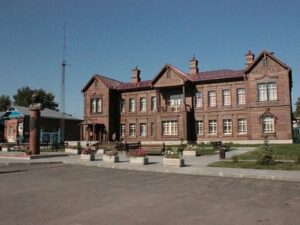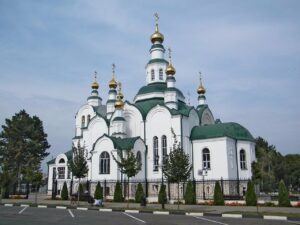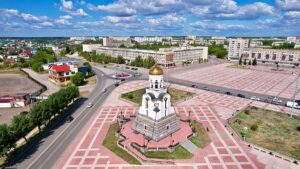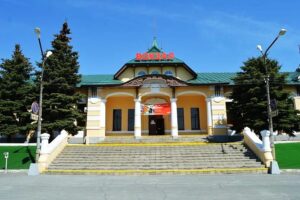
Introduction
Wuppertal, often referred to as the “city in the valley,” is one of Germany’s most intriguing urban landscapes. Nestled in the North Rhine-Westphalia region, this city is characterized by its distinctive topography, vibrant cultural scene, innovative transportation system, and rich industrial heritage. With a population of around 350,000, Wuppertal is both a bustling metropolitan area and a green oasis, offering a diverse array of experiences for residents and visitors alike.
Historical Background
Early History: The roots of Wuppertal trace back to several smaller communities that flourished along the Wupper River. Archaeological findings suggest that the area was inhabited as early as the Paleolithic era. The fertile valley and the river’s strategic location made it an attractive settlement area throughout history.
Industrial Revolution: Wuppertal’s modern history began in the 19th century when it became a center of the Industrial Revolution. The merger of Barmen and Elberfeld, along with several smaller communities, in 1929 officially created the city of Wuppertal. The city quickly grew into an industrial powerhouse, particularly known for its textile, chemical, and machinery industries. The river and the surrounding hills provided both resources and transportation routes that fueled economic growth.
World War II: Wuppertal, like many other German cities, suffered significant damage during World War II. The industrial areas were targeted by Allied bombings, leading to substantial loss of life and infrastructure. Post-war reconstruction efforts transformed the city, blending modern architecture with preserved historical sites.
Post-War Development: The second half of the 20th century saw Wuppertal transition from an industrial hub to a more diversified economy. The city’s educational institutions, particularly the University of Wuppertal, played a crucial role in this transformation. Wuppertal also developed a strong cultural scene, with theaters, museums, and festivals becoming integral parts of the city’s identity.
Architectural Highlights
Wuppertal Suspension Railway (Wuppertaler Schwebebahn): Arguably Wuppertal’s most iconic feature, the Wuppertal Suspension Railway is the world’s oldest electric elevated railway with hanging cars. Opened in 1901, it stretches approximately 13.3 kilometers along the Wupper River and serves as both a practical mode of transportation and a tourist attraction. The unique design and engineering marvel of the Schwebebahn reflect Wuppertal’s innovative spirit.
Historic Town Hall (Historisches Rathaus): The Historic Town Hall, located in Elberfeld, is a testament to Wuppertal’s architectural heritage. Built in the late 19th century, the building showcases a mix of neo-Gothic and neo-Renaissance styles. Its intricate facade and grand interiors make it a prominent landmark in the city.
Botanical Garden (Botanischer Garten): Situated on the Hardt Hill, the Botanical Garden offers stunning views of Wuppertal and its surroundings. Established in 1890, the garden features a diverse collection of plants from around the world. The historical greenhouses and the Elisenhöhe pavilion add to the garden’s charm, making it a serene retreat for nature lovers.
St. Laurentius Church: This neo-Gothic church, located in the heart of Wuppertal-Elberfeld, is one of the city’s most beautiful religious buildings. Completed in 1835, St. Laurentius Church features impressive stained glass windows, intricate woodwork, and a striking spire. It remains an active place of worship and a key architectural highlight.
Cultural and Artistic Scene
Von der Heydt Museum: The Von der Heydt Museum is one of Wuppertal’s premier cultural institutions. Housed in a former town hall building, the museum boasts an extensive collection of European art from the 16th century to the present. Works by renowned artists such as Monet, Picasso, and Munch are part of the permanent collection. The museum also hosts temporary exhibitions, educational programs, and special events.
Pina Bausch and Tanztheater Wuppertal: Wuppertal is synonymous with the legendary choreographer Pina Bausch, who revolutionized the world of modern dance. Her dance company, Tanztheater Wuppertal, continues to perform her innovative works, blending dance, theater, and visual art. The company’s performances attract audiences from around the globe, solidifying Wuppertal’s status as a cultural hub.
Opernhaus Wuppertal: The Wuppertal Opera House, known for its stunning architecture and excellent acoustics, is a key venue for opera, ballet, and musical theater. The opera house’s diverse repertoire includes both classic and contemporary works, performed by talented local and international artists. It is a cultural cornerstone, contributing significantly to the city’s artistic vibrancy.
Wuppertal Literature Biennale: This biennial literary festival celebrates the written word, bringing together authors, poets, and readers for a series of readings, discussions, and workshops. The Wuppertal Literature Biennale showcases the city’s commitment to fostering a love for literature and supporting the literary arts.
Natural Beauty and Outdoor Activities
Wupper River: The Wupper River, flowing through the heart of the city, is central to Wuppertal’s identity. The river’s scenic banks are ideal for leisurely walks, cycling, and picnicking. Efforts to restore and preserve the river’s natural environment have made it a haven for wildlife and a beautiful urban escape.
Hardt Park: Located on one of Wuppertal’s many hills, Hardt Park offers panoramic views of the city and surrounding areas. The park features walking trails, manicured gardens, and recreational facilities. The Botanical Garden and the historical Hardt Tower are key attractions within the park.
Nordpark: Nordpark is a large urban park that provides ample space for outdoor activities. With its extensive network of trails, sports facilities, and playgrounds, it is a favorite destination for families and fitness enthusiasts. The park’s lush greenery and tranquil atmosphere offer a perfect retreat from the urban hustle.
Arboretum Burgholz: Situated on the outskirts of Wuppertal, the Burgholz Arboretum is a forested area home to a diverse range of tree species from around the world. The arboretum’s well-marked trails allow visitors to explore its natural beauty while learning about different types of trees. It is a popular spot for hiking, bird-watching, and educational excursions.
Educational and Research Institutions
University of Wuppertal (Bergische Universität Wuppertal): Founded in 1972, the University of Wuppertal is a leading academic institution known for its research excellence and innovative programs. The university offers a wide range of undergraduate and graduate courses across disciplines such as engineering, natural sciences, humanities, and social sciences. Its modern campus, located on the Grifflenberg hill, provides state-of-the-art facilities and a vibrant academic community.
Wuppertal Institute for Climate, Environment and Energy: This internationally renowned research institute focuses on sustainability and environmental issues. The Wuppertal Institute conducts cutting-edge research on topics such as energy transitions, climate policy, and sustainable urban development. Its work informs policy-making and contributes to global efforts to address environmental challenges.
Junior Uni Wuppertal: The Junior Uni Wuppertal is an innovative educational institution designed to inspire young minds. Offering courses and workshops for children and teenagers, the Junior Uni covers a wide range of subjects, from science and technology to arts and humanities. The hands-on, interdisciplinary approach encourages curiosity and creativity, preparing students for future academic and professional success.
Festivals and Events
Wuppertal Schwebebahn Day: This annual event celebrates Wuppertal’s iconic suspension railway. On Schwebebahn Day, visitors can enjoy special rides, guided tours, and various activities centered around the railway. The event highlights the engineering marvel of the Schwebebahn and its significance to the city.
Wuppertaler Bühnen Night: Wuppertaler Bühnen Night is an annual cultural event that showcases the city’s performing arts scene. Theaters, opera houses, and other cultural venues open their doors to the public, offering a night of performances, workshops, and behind-the-scenes tours. It is a fantastic opportunity for residents and visitors to experience the richness of Wuppertal’s artistic offerings.
Christmas Market (Weihnachtsmarkt): Wuppertal’s Christmas Market is a festive highlight, transforming the city center into a winter wonderland. The market features charming wooden stalls selling crafts, gifts, and seasonal treats. Visitors can enjoy mulled wine, roasted chestnuts, and holiday music while exploring the market’s delights.
Elberfelder Cocktail Festival: This lively festival celebrates the art of mixology, bringing together cocktail enthusiasts and bartenders from around the region. The Elberfelder Cocktail Festival offers tastings, workshops, and competitions, providing a fun and educational experience for participants.
Culinary Scene
Traditional Cuisine: Wuppertal’s culinary scene is influenced by its industrial heritage and multicultural population. Traditional dishes include “Rheinischer Sauerbraten” (marinated pot roast), “Reibekuchen” (potato pancakes), and “Pillekuchen” (potato cake). These hearty meals reflect the region’s culinary traditions and can be enjoyed at local restaurants and eateries.
Modern Dining: In addition to traditional cuisine, Wuppertal boasts a diverse array of modern dining options. The city’s restaurants offer a range of international cuisines, from Italian and Mediterranean to Asian and Middle Eastern. The vibrant food scene caters to all tastes and preferences, with gourmet dining, casual bistros, and trendy cafes.
Craft Breweries and Beer Gardens: Wuppertal has a growing craft beer scene, with several local breweries producing a variety of unique and flavorful beers. Beer gardens and pubs are popular social spots, where visitors can sample local brews and enjoy the convivial atmosphere. The “Bergische Bier” is a regional specialty that beer enthusiasts should not miss.
Shopping and Retail
City Arcaden Wuppertal: City Arcaden is a modern shopping mall located in the heart of Wuppertal-Elberfeld. It features a wide range of stores, from fashion and electronics to beauty and lifestyle products. The mall’s central location and diverse offerings make it a convenient and popular shopping destination.
Luisenviertel: The Luisenviertel neighborhood is known for its charming streets lined with boutique shops, cafes, and galleries. This area is perfect for leisurely shopping, with unique stores offering everything from fashion and accessories to art and antiques. The relaxed atmosphere and pedestrian-friendly streets make it a delightful place to explore.
Weekly Markets: Wuppertal’s weekly markets are a great way to experience local culture and cuisine. The Elberfelder Markt and Barmer Wochenmarkt are particularly popular, offering fresh produce, artisanal goods, and delicious street food. These markets provide an authentic taste of Wuppertal and a chance to interact with local vendors.
Economic and Industrial Landscape
Textile Industry: Historically, Wuppertal was a major center for the textile industry, with numerous mills and factories producing high-quality fabrics. While the industry has declined in recent decades, the city’s textile heritage remains an important part of its identity. Some traditional textile companies still operate in Wuppertal, preserving the craftsmanship and expertise of the past.
Modern Industry: Today, Wuppertal’s economy is diverse and dynamic, with key sectors including manufacturing, technology, and services. The city is home to several large companies, such as Bayer (pharmaceuticals), Vorwerk (household appliances), and Knipex (hand tools). These companies contribute to Wuppertal’s economic stability and provide employment opportunities for residents.
Innovation and Startups: Wuppertal has a growing startup scene, supported by local incubators and innovation hubs. The city’s universities and research institutions play a crucial role in fostering innovation and entrepreneurship. Startups in fields such as information technology, biotechnology, and renewable energy are finding success in Wuppertal, contributing to its reputation as a center for innovation.
Trade and Commerce: Wuppertal’s strategic location and excellent transportation infrastructure make it an important hub for trade and commerce. The city is well-connected by rail, road, and air, facilitating the movement of goods and services. The local Chamber of Commerce supports businesses and promotes economic development, helping to attract investment and create jobs.
Community and Quality of Life
Education and Schools: Wuppertal offers a high standard of education, with a range of schools and educational institutions to choose from. The city’s schools provide quality education from primary to secondary levels, with both public and private options available. The University of Wuppertal and other higher education institutions further enhance the city’s educational landscape.
Healthcare: The city has a comprehensive healthcare system, with modern hospitals, clinics, and medical practices providing excellent care to residents. The Helios University Hospital Wuppertal and other healthcare facilities offer a wide range of medical services, ensuring the well-being of the community.
Public Transportation: Wuppertal’s public transportation network is efficient and well-developed, making it easy to navigate the city and surrounding areas. The Schwebebahn, buses, and trains connect key neighborhoods and attractions, providing convenient and reliable transit options. The central train station offers connections to other major cities in Germany and beyond.
Safety and Community: Wuppertal is known for its safe and welcoming atmosphere. The city’s low crime rate and strong sense of community make it an attractive place to live and visit. Various community organizations and initiatives promote social cohesion and support residents in need.
Housing and Living Costs: Housing in Wuppertal is relatively affordable compared to larger German cities. The city offers a range of housing options, from modern apartments to historic homes. The cost of living is reasonable, with expenses such as groceries, transportation, and entertainment being more affordable than in major metropolitan areas.
Notable Personalities
Friedrich Engels: One of Wuppertal’s most famous sons, Friedrich Engels was a philosopher, social scientist, and co-author of “The Communist Manifesto” with Karl Marx. Born in Barmen (now part of Wuppertal), Engels’ early experiences in the industrial town influenced his views on capitalism and labor.
Pina Bausch: Pina Bausch, the pioneering choreographer and dancer, made Wuppertal her artistic home. Her innovative approach to dance theater brought international acclaim to Tanztheater Wuppertal and left a lasting impact on the world of performing arts.
Else Lasker-Schüler: Else Lasker-Schüler, a prominent poet and playwright, was born in Elberfeld (now part of Wuppertal). Her avant-garde works and bohemian lifestyle made her a key figure in early 20th-century German literature and culture.
Armin T. Wegner: Armin T. Wegner was a writer and human rights activist from Wuppertal who documented the Armenian Genocide. His efforts to raise awareness about the atrocities earned him international recognition and made him a symbol of courage and moral integrity.
Conclusion
Wuppertal is a city that captivates with its unique blend of historical charm, cultural vibrancy, and modern innovation. From the iconic Schwebebahn and lush green parks to its rich industrial heritage and thriving artistic scene, Wuppertal offers a diverse array of experiences for residents and visitors alike. The city’s commitment to education, sustainability, and community well-being ensures a high quality of life and a promising future. Whether exploring its architectural landmarks, enjoying its natural beauty, or delving into its cultural treasures, Wuppertal stands as a testament to the enduring spirit and resilience of its people. Discovering Wuppertal is a journey through the past, present, and future of one of Germany’s most fascinating cities.




